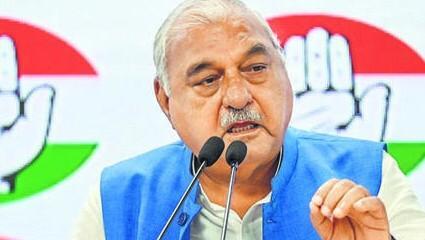
Punjab Curtailing Haryana’s Water is Inhuman: Bhupinder Hooda
The ongoing dispute between Punjab and Haryana over water sharing has taken a new turn with Congress leader Bhupinder Singh Hooda expressing his strong views on the issue. According to Hooda, the Punjab government’s decision to curtail Haryana’s water supply is not only unconstitutional but also immoral and inhuman.
In a recent statement, Hooda emphasized that Haryana is not begging for water, but rather, it is the state’s share of water that has been decided under a proper agreement. He further criticized the BJP government in Haryana for its failure to claim its rightful share of water till now.
The dispute over water sharing between Punjab and Haryana has been ongoing for several years, with both states having different claims over the water resources. The issue has led to severe water scarcity in Haryana, affecting the state’s agriculture and industries.
Hooda’s statement is significant as it comes from a prominent leader of the Congress party, which has been a key player in the politics of both Punjab and Haryana. The party has always been vocal about the need to resolve the water sharing dispute amicably and has supported the efforts of the central government to find a solution to the problem.
The Congress leader’s statement is also important as it highlights the human rights dimension of the issue. Hooda has emphasized that the Punjab government’s decision to curtail Haryana’s water supply is inhuman and immoral, implying that it is a violation of the basic human rights of the people of Haryana.
The dispute over water sharing between Punjab and Haryana is not a new issue. It has been ongoing for several decades and has been a major source of tension between the two states. The issue has been exacerbated by the fact that both states are facing severe water scarcity due to the increasing demand for water and the decreasing availability of water resources.
The central government has been trying to resolve the dispute through negotiations and has set up a committee to study the issue. However, the efforts have been unsuccessful so far, and the dispute remains unresolved.
The Punjab government has been curtailing Haryana’s water supply citing its own needs and the need to conserve water. However, Haryana has been claiming that the Punjab government is not fulfilling its obligations under the water sharing agreement and is instead diverting water to its own areas.
Haryana has been facing severe water scarcity due to the dispute, and the state’s agriculture and industries have been severely affected. The state has been importing water from other states to meet its needs, but this has been a costly and inefficient solution.
The dispute over water sharing between Punjab and Haryana is not only a matter of interstate politics but also has implications for the national economy. The issue has the potential to impact the agriculture and industries of the entire region, and a solution needs to be found urgently to avoid any adverse consequences.
In conclusion, the statement of Bhupinder Hooda is significant as it highlights the human rights dimension of the issue and emphasizes the need to resolve the dispute amicably. The Punjab government’s decision to curtail Haryana’s water supply is not only unconstitutional but also immoral and inhuman, and it is the responsibility of the central government to ensure that the rights of all states are respected and protected.
It is high time that the central government takes concrete steps to resolve the dispute and ensures that the water sharing agreement is implemented in its true spirit. The issue needs to be resolved through negotiations and dialogue, and the central government needs to play a proactive role in finding a solution.
Only a solution to the water sharing dispute between Punjab and Haryana can ensure that the region’s agriculture and industries are able to thrive and that the people of both states are able to live with dignity.






